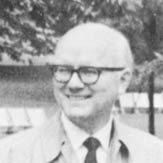William Shannon
- 1969

Fellowship Title:
- Comparative Study of English Political Institutions
Fellowship Year:
- 1969
The British General Election: Polls, Politics, and the Press
It is a common American misapprehension that British election campaigns are much shorter than presidential elections in the United States. That used to be true and, under certain circumstances, could be true again in the future, but it is certainly not a valid judgment in 1970. There have been so-called “snap” elections such as the one which Stanley Baldwin unexpectedly called in 1923 on the tariff issue and that which Ramsay MacDonald called in 1931 when he formed an all-party coalition to deal with the economic crisis. But the general election, which Harold Wilson has scheduled for June 18, is no surprise and no short-run affair. In Britain, the politicians, the press, and the five to ten per cent of the public who follow politics with an active interest have been preoccupied with the coming election since January. It would not be stretching the word “preoccupied” very far to say that these same people have been preoccupied with the election since last September when the annual party conferences were held in successive weeks in Brighton.
The Struggle for British Schools
William V. and Elizabeth Shannon The education of one’s children is in England, as in America, a top-ranking conversational topic. It is also probably, the most deeply felt political issue before the country. At cocktail parties and dinners, in the beauty shop and the barbershop and on park benches, in Parliament and at political meetings, the questions are rehearsed endlessly. In the United States, there is basically only one question: public or private (and within the private category, progressive or conservative). But the choices for a British parent seem endless and bewildering to an outsider. The terminology alone is staggering: Aided School, Comprehensive School, Controlled School, County School, Direct Grant School, Independent School, Maintained School, Secondary Modern School, Voluntary School, and Grammar School. This diversity developed because in 1870, when the British Government first assumed state responsibility for education, there already existed a wide range of schools run by the Church of England, by the Methodists and other denominations, and by the Catholic Church. Since it was politically impossible to sweep away these church-related schools,
Conflict of Interests in Parliament
In 1968, rumors circulated in Westminster that the new Greek military dictatorship had an M.P. on its payroll. Gordon Bagier, a Labor M.P. who had praised the new regime at a press conference in Athens in April, 1968, and who was active in it urging other M.P.’s to visit Greece to “learn the facts,” was queried by a newspaper as to what he knew about these rumors. Mr. Bagier indignantly declared: “The claim that Mr. Fraser [a public relations man representing Greece] has a British M.P. in the pay of the Greek Government has amazed and angered everyone. This would be an atrocious situation if true, but I have been in Parliament long enough to know that the claim is quite fantastic.” The press printed his ringing denial. Several months later, a television news show obtained documentary proof that Mr. Bagier was receiving a retainer from the Fraser firm. Nominally, his assignment was to obtain “new business” but actually he acted as go-between with other M.P.’s on behalf of the Greek Government. Mr. Bagier promptly
Money and Politics
Contemporary Britain has the cleanest politics of any of the major democratic countries. In the 20th century, it has never had the messy financial scandals which were almost routine in French Government during the Third and Fourth Republics. No British ministry has experienced in recent decades a case of serious corruption such as the Teapot Dome oil lease bribery in the Interior Department during the Harding Administration or the tax-fixing and influence-peddling in the Justice Department during the Truman Administration. Like so much else in contemporary Britain, the integrity of public life was an accomplishment of the earnest, aspiring Victorians. Eighteenth century British politics was as gamy as anyone could desire. Corruption in contracts, payroll padding, the sale of Army commissions, the bribery of voters, nepotism, sinecures—every form of political corruption was rife. During the last century, a succession of high-minded political leaders like Peel and Gladstone gradually constructed an impartial civil service and insulated it from corrupting influences. Ultimately, politics was transformed from an aristocratic game of individuals and cliques into a contest between
How does one become an M.P.?
There are several differences between the way in which one becomes a Member of Parliament and the way in which one gets elected to the House of Representatives. Mathematically, the chance of becoming an M.P. is much higher. Britain with only 50 million people has 630 M.P.’s while the U.S. with 200 million people has only 435 representatives. To provide the same proportion, the House of Representatives would have to be increased to about 2500 members. The difference which is most striking to an American, however, is that in Britain most M.P.’s are not natives or even residents of the constituencies they represent. In the United States where politics is locally rooted, it is legally possible but exceedingly rare for a person to be elected to the House in a district in which he does not live. This is the source of a major frustration in American politics. There are many more potential candidates for Congress among the better-educated, sophisticated, and wealthy people in the metropolitan areas than there are places available. Local and state
